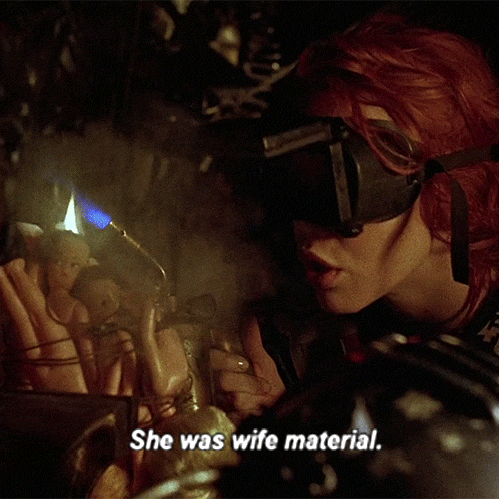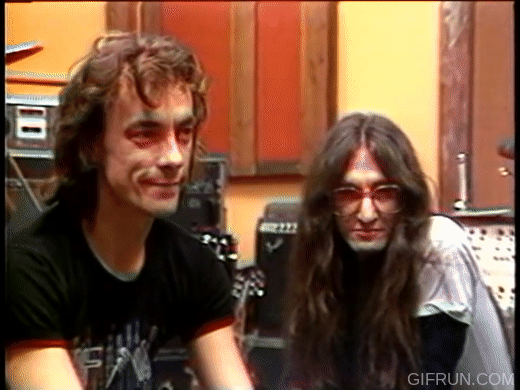Wonder what's going on here lol:
Some kind of Jungian shadow thing lol?
Someone posted those images in response to something Grimes tweeted.
It is very milquetoast liberal vibes tbf.I think so much of what's been happening over the last decade is simply that the art of diplomacy, oration, and generally competent leadership has been lost.
The purpose of politics is to find solutions when the population can't agree - but both sides have stoked hysteria rather than provide mature competent leadership.
For whatever ways in which one wishes to complain about administrations before this - there was a sense of decorum by both republicans and democrats that - no matter what you think - showed at least the veneer of respect towards the people - that is part of leadership. and that counts for a lot with regards to maintaining stability and yes, mental health
Also reminded of jreg lol (can't post all the videos there's a whole series):
Yeh so to clarify - a lot of jobs are about to disappear - many of them unpleasant - fine - but with no replacement you've got a lot of unemployed single men - already less educated and less employed than women.
Probably this is just a massive social failure for anyone to take responsibility from a macro pov but also if for some reason u want a civil war or an army this shud work
At what point do we all stop feigning incomplicity ?AI isn't replacing garbagemen first. that's last. well, plumbers are LAST last.
it's the convenient slacker easy jobs - cubicles with 5 hours of productive work in a 40 hour week, that are going away. (first)Those boys can barely LARP war when playing CoD so I'm not super worriedYou're going to meet them at a very strange time in their lives.I'm really not, either. Men - if permitted- will go do men things.
It's funny that you don't....
Conscientiousness is one of the five traits of both the Five Factor Model and the HEXACO model of personality and is an aspect of what has traditionally been referred to as having character. Conscientious individuals are generally hard-working and reliable. When taken to an extreme, they may also be "workaholics", perfectionists, and compulsive in their behavior.[2] People who score low on conscientiousness tend to be laid back, less goal-oriented, and less driven by success, if they also score high on Big Five Agreeableness; otherwise, they are also more likely to engage in anti-social behavior and commit blue-collared crimes and crimes of passion.[3]Robert Ritter, the head of Nazi Germany's efforts to track the genealogies of the Romani, considered them a "highly inferior Lumpenproletariat" as they were "parasites who lacked ambition and many of them had become habitual criminals."[70] The Romani were seen in post-World War II communist-ruled eastern and central Europe as an example of the lumpenproletariat and were, therefore, subject to an aggressive policy of assimilation.[71]
Ken Gelder noted that in cultural studies, subcultures are "often positioned outside of class, closer in kind to Marx's lumpenproletariat, lacking social consciousness, self-absorbed or self-interested, at a distance from organised or sanctioned forms of labour, and so on."[72]"social degenerates, isolated from the forces of production and incapable of having a working-class consciousness." Svetlana Stephenson notes that the Soviet state "for all its ideology of assistance, cooperation and social responsibility, was ready to descend on them with all its might."Due to a desire to keep clean the hands of the larger public, paramilitary groups are often used to commit atrocities and they often recruit mainly among criminals, said to be used to violence and brutality and wanting to enjoy an occasion to loot.[90] The lumpenproletariat has been described as being more likely to adhere to doctrines calling for ethnic cleansing and to organize in militias.[91]Zheani Sparkes grew up in central Queensland, "super rural?really impoverished, low-socioeconomic," she tells me with grit. "Everyone's on government weekly payments. No one has careers and jobs, parents don't work. I'm going to public school, and all the adults are wrapped up in their own dramas rather than choosing to invest time in creation with their kids."
She likens her "shit hole country school? to a prison, "I'm not an art school kid," she says, "but shout out to kids that get to live that. It sounds like an amazing childhood. I was just another fucking mutt [BEEP] trying to make my way in the world, and getting caught up into a series of absolutey bizarre events."Oh well lol."In my music, I come across ... like I wanna destroy, but there's the flipside of me [that?s] maternal and wants to protect ... I'm almost proving to the adults in my life that it?s not even fucking hard to take care of people," she says. ?Like, why was it so fucking hard for you to give a stable, nurturing environment where I didn?t have to watch horrible domestic violence ..."
Using music to purge her childhood trauma, Zheani says, "is the most embarrassing thing you could ever imagine." Prior to making music, she'd spent the past 28 years of her life hiding her upbringing. "My parents didn't even fucking work. I can't even say I was working class," she says. "But I was able to overcome that feeling of shame and turn it into pride and empowerment."
Cause you think everyone's going to become an artist or something or an 'influencer' I guess (that came up several times in the tweets like that won't be replaced by AI too anyway lol,) and I'm here to tell you they won't.
New music when? New music right now.
Surprise! Pathetic Waste is OUT NOW follow the link to watch the music video! PATHETIC WASTE is an internal monologue, the kind of self deprecating stream that runs through an ADHD mind in the face of failure. This river of vitriol flows for years eroding away at your heart more with each wasted day...
did you miss me? I missed you xIt's not the best thing ever, but I like this stuff, but there's a lot of rage (it's like we have two emotions 'zombie' and 'rage'):Zheani was featured in a Revolver article titled "SEE ZHEANI FACE DEMONS IN STUNNING VIDEO FOR NEW SONG "PATHETIC WASTE"".[2] The article featured a message from Zheani:
"My music is almost always defiant and affirmational", "Within it, I'm a warrior, a goddess. I am victorious in my art because I so desperately want to be victorious and for my victories to be loved. My fans see me this way, like an avatar, someone powerful and larger than life. But with 'Pathetic Waste,' I try to be more honest about the mundane struggle that my life can often feel like. The pain that my own inadequacy can cause the ones I love. The missed opportunities and squandered relationships. All of this falls in my wake as I drudge forward thinking, 'What if I'm one of the bad people?'"
^ I love this symbolically because it doesn't even finish. It just fades into nothing like he didn't finish it.
Which is part of you know (the internet):
This is the music made by younger millenials and gen z. The stuff by the younger millennials/older gen z is the angriest sounding I think. Like the musicians in their late 20s-mid 30s compared to younger gen z. But not just now it was before as well (like when Halsey was younger):
Probably because:
Imagine if I could read this BBC article but I can't because someone in the UK pays to not be able to read this (thankfully I don't pay for a TV licence anyway):Popular music is getting sadder and angrier and more fearful, new study finds after examining lyrics last 50 years
https://www.bbc.com/culture/article/...er-and-angrier
Is pop music really getting sadder and angrier?
13 May 2019-- Expressions of anger and disgust roughly doubled over those 65 years, for instance, while fear increased by more than 50%.This is why music is like this lol.Page unavailable
We're sorry but this page is not accessible from the UK as it is part of our international service and is not funded by the licence fee. It is run commercially by BBC Global News Limited, a wholly-owned subsidiary of the BBC (and just the BBC). The money made from it goes back to help fund the BBC's international journalism.
We don't view people who lack ambition well. It's going to drive a lot of people insane - the level of contempt they're going to recieve. Like being plunged into freezing cold water too if they were previously employed and aren't part of the class that are either generationally unemployed (and often zombified though they do obviously have a higher crime rate cause that's often how you get out of the boring dystopia unfortunately,) or the recent generations who have just been gradually dropping out of the work force in early adulthood anyway.
People's entire identity and worth in society is built around their career. Cis men can't even give birth yet so they don't even have that (not really respected except by conservatives,) playing card.
And you haven't solved any of that before doing this.
The AI industry trusts, implicitly, that AI surveillance, AI military tech, and AI corporate defenses will protect them from any social or violent blowback from making hundreds of millions of young men unemployed globally.
They think their Skynet will protect them from the Mob.
If they're right, they're willing for Skynet drones to kill millions to protect AI corporate leaders and employees.
If they're wrong, they get lynched by the Mob.
Either way, a bad outcome.
They really have NOT thought this through.



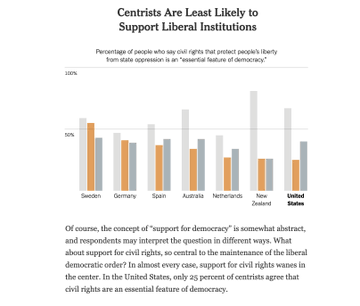
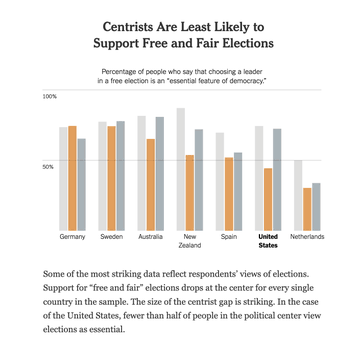
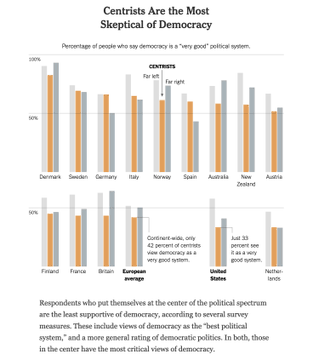

 Reply With Quote
Reply With Quote